Judges have announced the finalists for the 2025 ASLE Book Awards. The awards, in the categories of ecocriticism and environmental creative writing, were established in 2007 and have been given biennially to recognize excellence in the field.
Winners will be announced this July and celebrated at the Authors/Awards Reception at the 2025 Conference at the University of Maryland, College Park on July 9. The finalists are books authored or edited by ASLE and international affiliate members. Congratulations to our short-listed authors, read more about their books below!
ASLE Ecocritical Book Award Finalists
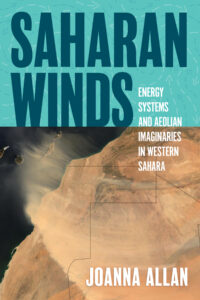 Joanna Allan, Saharan Winds: Energy Systems and Aeolian Imaginaries in Western Sahara
Joanna Allan, Saharan Winds: Energy Systems and Aeolian Imaginaries in Western Sahara
West Virginia University Press, 2024
Saharan Winds contributes to a fairer energy horizon by illuminating the role of imaginaries—how we understand energy sources such as wind and the meanings we attach to wind—in determining the wider politics, whether oppressive or just, associated with energy systems. This book turns to various cultures and communities across different time periods in Western Sahara to explore how wind imaginaries affect the development, management, and promotion of wind farms; the distribution of energy that wind farms produce; and, vitally, the type of politics mediated by all these elements combined. Highlighting the wind-fueled oppression of colonial energy systems, the book shows the potential offered by nomadic, Indigenous wind imaginaries for contributing to a fairer energy future.
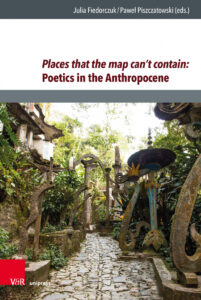 Julia Fiedorczuk and Pawel Piszczatowski, eds., Places That the Map Can’t Contain: Poetics in the Anthropocene
Julia Fiedorczuk and Pawel Piszczatowski, eds., Places That the Map Can’t Contain: Poetics in the Anthropocene
Brill | V&R Unipress, 2023
Inspired by Lynn Keller’s notion of “the self-conscious Anthropocene,” the book sets out to consider poetry as a privileged space for rethinking our basic epistemological assumptions. Poetry does not have the kind of agency a direct political intervention has; in fact, as WH Auden famously put it, “poetry makes nothing happen.” On the other hand, poetry is crucial when it comes to awakening our individual and collective imagination. Considering the statement by Lawrence Buell that the current ecological crisis is, in the first place, a crisis of the imagination, this function of poetry comes through as particularly important.
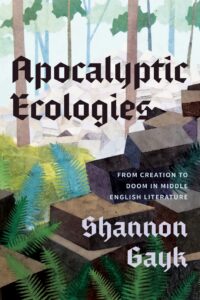 Shannon Gayk, Apocalyptic Ecologies: From Creation to Doom in Middle English Literature
Shannon Gayk, Apocalyptic Ecologies: From Creation to Doom in Middle English Literature
The University of Chicago Press, 2024
When a series of ecological disasters swept medieval England, writers turned to religious storytelling for precedents. Their depictions of biblical floods, fires, storms, droughts, and plagues reveal an unsettled relationship to the natural world, at once unchanging and bafflingly unpredictable. In Apocalyptic Ecologies, Shannon Gayk traces representations of environmental calamities through medieval plays, sermons, and poetry such as Cleanness and Piers Plowman. In premodern disaster writing, she recovers a vision of environmental flourishing that could inspire new forms of ecological care today: a truly apocalyptic sensibility capable of seeing in every ending, every emergency a new beginning waiting to emerge.
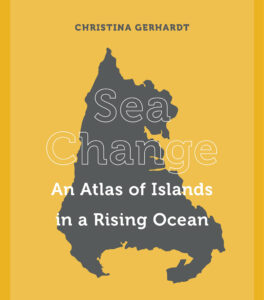 Christina Gerhardt, Sea Change: An Atlas of Islands in a Rising Ocean
Christina Gerhardt, Sea Change: An Atlas of Islands in a Rising Ocean
University of California Press, 2023
Sea Change: An Atlas of Islands in a Rising Ocean is a groundbreaking work that invites readers to rethink the challenges faced by low-lying islands amid the devastating impacts of climate change. Gerhardt weaves environmental studies, environmental humanities, geography, cartography, and creative nonfiction to reveal the rich histories and cultures of frontline communities, while highlighting diverse actions undertaken to protect and preserve their islands.
Attending to the voices of Indigenous and Black communities, Gerhardt underscores the environmental injustices disproportionately affecting those least responsible for global warming. The book examines a range of strategies in the fight against climate change, from hard engineering solutions such as sea walls and raising islands to soft engineering approaches like restoring coral and oyster reefs and safeguarding mangrove forests and wetlands. Embodying a spirit of hope and resilience, the book asserts, “We are not drowning! We are fighting!”
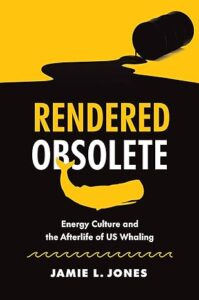 Jamie L. Jones, Rendered Obsolete: Energy Culture and the Afterlife of US Whaling
Jamie L. Jones, Rendered Obsolete: Energy Culture and the Afterlife of US Whaling
University of North Carolina Press, 2023
Here, from our modern age of fossil fuels, Jamie L. Jones uses literary and cultural history to show how the whaling industry held firm in US popular culture even as it slid into obsolescence. Jones shows just how instrumental whaling was to the very idea of “energy” in American culture and how it came to mean a fusion of labor, production, and the circulation of power. She argues that dying industries exert real force on environmental perceptions and cultural imaginations.
Analyzing a vast archive that includes novels, periodicals, artifacts from whaling ships, tourist attractions, and even whale carcasses, Jones explores the histories of race, labor, and energy consumption in the nineteenth-century United States through the lens of the whaling industry’s legacy. In terms of how they view power, Americans are, she argues, still living in the shadow of the whale.
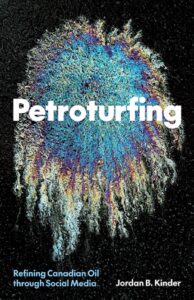 Jordan B. Kinder, Petroturfing: Refining Canadian Oil Through Social Media
Jordan B. Kinder, Petroturfing: Refining Canadian Oil Through Social Media
University of Minnesota Press, 2024
Petroturfing presents an incisive look into how Canada’s pro-oil movement has leveraged social media to rebrand the extractive economy as a positive force. Adapting its title from the concept of astroturfing, which refers to the practice of disguising political and corporate media campaigns as grassroots movements, the book exposes the consequences of this mutually informed relationship between social media and environmental politics.
By uncovering these concerted efforts to influence the “energy consciousness,” Jordan B. Kinder reveals the deep divide between Canada’s environmentally progressive reputation and the economic interests of its layers of government and private companies operating within its borders. Drawing attention to the structures underlying online political expression, Petroturfing highlights the limitations of social media networks in the work of promoting environmental justice and contributing to a more equitable future.
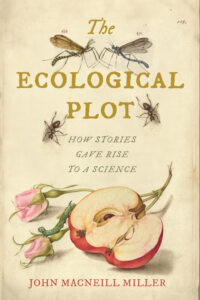 John MacNeill Miller, The Ecological Plot: How Stories Gave Rise to Science
John MacNeill Miller, The Ecological Plot: How Stories Gave Rise to Science
University of Virginia Press 2024
Ecology, economics, and realist fiction seem like opposed modes of thought today, but they all rely on a form of narrative storytelling Miller calls “the ecological plot.” This book charts the evolution of ecological plots over the last two centuries to underscore what unites these fields and to urge their reconciliation. Miller’s book reveals why our most sophisticated efforts to explain humanity’s relationship to nature have been segregated into different disciplines and makes an argument for the importance of bringing these separate ways of understanding the world back together as a crucial step toward solving the environmental, economic, and ethical problems of the present.
 Kamala Joyce Platt, Environmental Justice Poetics: Cultural Representations of Environmental Racism from Chicanas and Women in India
Kamala Joyce Platt, Environmental Justice Poetics: Cultural Representations of Environmental Racism from Chicanas and Women in India
De Gryuter, 2023 (Paperback coming June 30, 2025)
This book is an interdisciplinary comparative investigation of activist, artistic, literary, and academic discourse—expressive work promoting ecological justice, ending racism, and representing self and community through virtual realism—a cultural poetics of environmental justice.
Research fixed on women’s work intervenes in patriarchal assumptions. Focus on marginalized areas in India and a U.S. movement led by people of color, defies racisms, and promotes vigilance against structural violence that permeates across political spectrums. Striving for environmental justice is not just community work, merely academic, or trendy art, performance, or literature. Environmental justice work demands interdisciplinary, transnational, transcommunity sharing, many border crossings and solid alliance-building. Chicanas and women in India engaged in such activities generate a rich cultural poetics—a transformative vision of environmental equity, ecological and civic wellbeing, and calming climate.
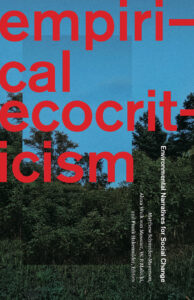 Matthew Schneider-Mayerson, Alexa Weik von Mossner, W. P. Malecki and Frank Hakemulder, eds., Empirical Ecocriticism: Environmental Narratives for Social Change
Matthew Schneider-Mayerson, Alexa Weik von Mossner, W. P. Malecki and Frank Hakemulder, eds., Empirical Ecocriticism: Environmental Narratives for Social Change
University of Minnesota Press, 2023
This volume combines an environmental humanities perspective with empirical methods derived from the social sciences to study the influence of environmental stories on our affects, attitudes, and actions. Empirical Ecocriticism provides an approachable introduction to this growing field’s main methods and demonstrates their potential through case studies on topics ranging from the impact of climate fiction on readers’ willingness to engage in activism to the political empowerment that results from participating in environmental theater. Part manifesto, part toolkit, part proof of concept, and part dialogue, this introductory volume is divided into three sections: methods, case studies, and reflections. International in scope, it points toward a novel and fruitful synthesis of the environmental humanities and social sciences.
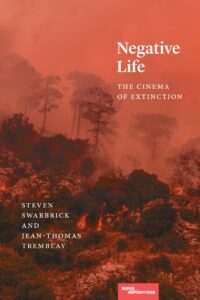 Steven Swarbrick and Jean-Thomas Tremblay, Negative Life: The Cinema of Extinction
Steven Swarbrick and Jean-Thomas Tremblay, Negative Life: The Cinema of Extinction
Northwestern University Press, 2024
Negative Life: The Cinema of Extinction brings cinema studies, queer theory, and psychoanalysis into novel configuration around the concept of negative life, a sundering of human and nonhuman relations. Engaging a philosophical and cinematic corpus that rejects the pastoralism of “entanglement” or “enmeshment,” Steven Swarbrick and Jean-Thomas Tremblay counter ecocritical pieties and cut a new path for theory. They examine films by Julian Pölsler, Kelly Reichardt, Lee Isaac Chung, Mahesh Mathai, Paul Schrader, and others that exemplify the existential contradictions currently intensifying amid the sixth mass extinction. Each case study testifies formally and thematically to negative life as a structural condition of thought and film. Together, the cases reveal the unlivable dimension of life and art, where form, desire, and nonbelonging tarry with the future-oriented promise of ecostudies—where all that lives connects. Negative Life militates against this promise, showing that faith in connection is a dead end.
ASLE Creative Writing Book Award Finalists
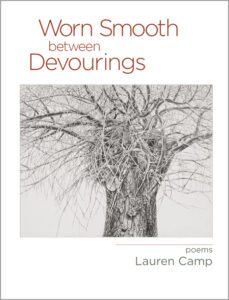 Lauren Camp, Worn Smooth between Devourings
Lauren Camp, Worn Smooth between Devourings
NYQ Books, 2023
The poems in Worn Smooth between Devourings travel through fears of ecological devastation and national and global tragedy, and map routes away from despair. Worry remains in the background, even in landscapes that still hold time’s beginning. Even in long love. “We are suspended in places / entire and different and home,” Camp writes. These precise, sonically-driven poems investigate a confessed gaze for contentment with the conviction of quiet rebellion. Through repeating distance, multiplying birds and crisscrossing storylines, they offer a testament to land and lack, grief, faith, and endurance.
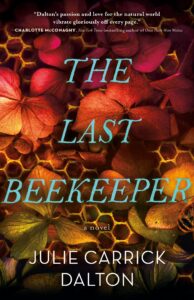 Julie Carrick Dalton, The Last Beekeeper
Julie Carrick Dalton, The Last Beekeeper
Forge, 2023
Julie Carrick Dalton’s The Last Beekeeper is a celebration of found family, an exploration of truth versus power, and the triumph of hope in the face of despair. It is a meditation on forgiveness and redemption and a reminder to cherish the beauty that still exists in this fragile world.
It’s been more than a decade since the world has come undone, and Sasha Severn has returned to her childhood home with one goal in mind—find the mythic research her father, the infamous Last Beekeeper, hid before he was incarcerated. There, Sasha is confronted with a group of squatters who have claimed the quiet, idyllic farm as their own. While she initially feels threatened, the group soon becomes her newfound family, offering what she hasn’t felt since her father was imprisoned: security and hope. Maybe it’s time to forget the family secrets buried on the farm and focus on her future. But just as she settles into her new life, Sasha witnesses the impossible. She sees a honey bee, presumed extinct. People who claim to see bees are ridiculed and silenced for reasons Sasha doesn’t understand, but she can’t shake the feeling that this impossible bee is connected to her father’s missing research. Fighting to uncover the truth could shatter Sasha’s fragile security and threaten the lives of her newfound family—or it could save them all.
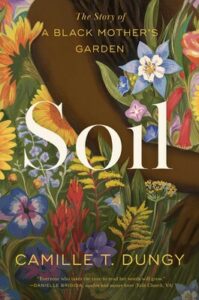 Camille T. Dungy, Soil: The Story of a Black Mother’s Garden
Camille T. Dungy, Soil: The Story of a Black Mother’s Garden
Simon & Schuster, 2023
In Soil: The Story of a Black Mother’s Garden, poet and scholar Camille T. Dungy recounts the seven-year odyssey to diversify her garden in the predominantly white community of Fort Collins, Colorado. When she moved there in 2013, with her husband and daughter, the community held strict restrictions about what residents could and could not plant in their gardens.
In resistance to the homogenous policies that limited the possibility and wonder that grows from the earth, Dungy employs the various plants, herbs, vegetables, and flowers she grows in her garden as metaphor and treatise for how homogeneity threatens the future of our planet, and why cultivating diverse and intersectional language in our national discourse about the environment is the best means of protecting it.
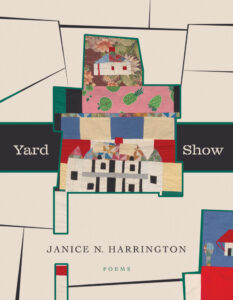 Janice N. Harrington, Yard Show
Janice N. Harrington, Yard Show
BOA Editions, Ltd., 2024
Black history, cultural expression, and the natural world fuse in Janice N. Harrington’s Yard Show to investigate how Black Americans have shaped a sense of belonging and place within the Midwestern United States. As seen through the documentation of objects found within yard shows, this collection of descriptive, lyrical, and experimental poems speaks to the Black American Imagination in all its multiplicity.
Harrington’s speaker is a chronicler of yesterdays, using the events of the past to center and advocate for a future that celebrates pleasure and self-fulfillment within Black communities.
 Emily Raboteau, Lessons for Survival: Mothering Against “the Apocalypse”
Emily Raboteau, Lessons for Survival: Mothering Against “the Apocalypse”
Henry Holt & Co, 2024
Lessons for Survival is a probing series of pilgrimages from the perspective of a mother struggling to raise her children to thrive without coming undone in an era of turbulent intersecting crises.
With camera in hand, Raboteau goes in search of birds, fluttering in the air or painted on buildings, and city parks where her children may safely play while avoiding pollution, pandemics, and the police. She ventures abroad to learn from Indigenous peoples, and in her own family and community, she discovers the most intimate examples of resilience. Raboteau bears witness to the inner life of Black womanhood, motherhood, the brutalities and possibilities of cities, while celebrating the beauty and fragility of nature. This innovative work of reportage and autobiography stitches together multiple stories of protection, offering a profound sense of hope.
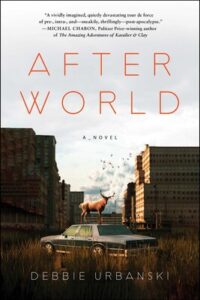 Debbie Urbanski, After World: A Novel
Debbie Urbanski, After World: A Novel
Simon & Schuster, 2023
Faced with the uncontrolled and accelerating environmental collapse, humanity asks an artificial intelligence to find a solution. Its answer is simple: remove humans from the ecosystem.
Sen Anon is assigned to be a witness for the Department of Transition, recording the changes in the environment as the world begins to rewild. Abandoned by her mother in a cabin somewhere in upstate New York, Sen will observe the monumental ecological shift known as the Great Transition, the final step in Project Afterworld. Around her drones buzz, cameras watch, microphones listen, digitizing her every move. Privately she keeps a journal of her observations, which are then uploaded and saved, joining the rest of humanity on Maia, a new virtual home. Sen was seventeen years old when the Digital Human Archive Project (DHAP) was initiated. 12,000,203,891 humans have been archived so far. Only Sen remains.
[storyworker] ad39-393a-7fbc’s assignment is to capture Sen’s life, and they set about doing this using the novels of the 21st century as a roadmap. As Sen struggles to persist in the face of impending death, [storyworker] ad39-393a-7fbc works to unfurl the tale of Sen’s whole life, offering up an increasingly intimate narrative until they are confronted with a very human problem of their own.
